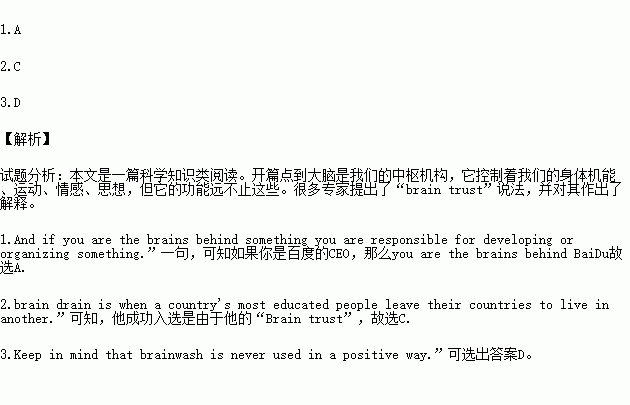题目内容
We all know what a brain is. A doctor will tell you that the brain is the organ of the body in the head. It controls our body's functions, movements, emotions and thoughts. But a brain can mean so much more.
A brain can also simply be a smart person, If a person is called brainy, she is smart and intelligent. If a family has many children but one of them is super smart, you could say, "She's the brains in the family. " And if you are the brains behind something you are responsible for developing or organizing something. For example, Bill Gates is the brains behind Microsoft.
Brain trust is a group of experts who give advice. Word experts say the phrase"brain trust" became popular when Franklin D. Roosevelt first ran for president in 1932, Several professors gave him advice on social and political issues facing the U. S.These professors were called his "brain trust. "
These ways we use the word "brain" all make sense. But other ways we use the word are not so easy to understand. For example, to understand the next brain expression, you first need to know the word“drain." As a verb to drain means to remove something by letting it flow away. So a brain drain may sound like a disease where the brain flows out the ears. But, brain drain is when a country's most educated people leave their countries to live in another. The brains are,sort of,draining out of the country.
However,if people are responsible for a great idea,you could say they brainstormed it. Here,brainstorm is not an act of weather. It is a process of thinking creatively about a complex topic. For example, business leaders may use brainstorming to create new products, and government leaders may brainstorm to solve problems.
If people are brainwashed, it does not mean their brains are nice and clean. To brainwash means to make someone accept new beliefs by using repeated pressure in a forceful or tricky way. Keep in mind that brainwash is never used in a positive way.
1.According to the text, if you're the CEO of Bai Du you can be called________.
A. the brains behind Bai Du
B. Bai Du's brain trust
C. the brain drain of Bai Du
D. the organ of Bai Du
2.Why did Roosevelt successfully win the election?
A. Because he was smart at giving advice.
B. Because word experts were popular.
C. Because he got his brain trust.
D. Because he was the brains behind America.
3.Which of the following expression is always used in a negative way?
A. Brain trust B. Brain drain
C. Brainstorm D. Brainwash
 全优考典单元检测卷及归类总复习系列答案
全优考典单元检测卷及归类总复习系列答案请认真阅读下列短文,并根据所读内容在文章后表格中的空格里填入最恰当的词(每空1词)。
Cheating on exams is popular in the various kinds of exams in colleges. Students don't feel shame to cheat on exams. Most of them don't care about cheating on exams. They know that results of cheating on exams aren't serious punishment, which leads to frequent cheatings on exams.
At the University of Nevada, after students photographed test questions with their cellphone cameras, transmitted them to classmates outside the exam room and got the answers back in text messages, the university put in place a new monitoring system.
With their electronic tools, students these days find it easier to cheat. And so, faced with a lot of the latest technology in recent years, college officials find themselves in a new game of cat and mouse, trying to outwit(胜过) would-be cheats this exam season with a range of strategies--cutting off Internet access from laptops, or demanding the surrender(交出) of cellphones before tests.
Mr Dapremont said technology had made cheating easier, but added that plagiarism(抄袭) in writing papers was probably a bigger problem because students can easily lift other people's writings off the Internet.
Still, some students said they thought cheating these days was more a product of the attitude, not the tools at hand. Pressure to succeed sometimes clouds everything and makes people do things that they shouldn't do. Students today feel more pressure to do well in order to graduate from school and secure a job.
Whatever the reasons for cheating, college officials say the battle against it is wearing them out. First, people cheating on exams will lose interest in studying. Second, he thinks studying isn't meaningful. Even though he doesn't do anything, he can get scores. Third, people cheating on exams will influence others. Plenty of people working hard think that their records are lower than people cheating on exams. Thus, we must ban cheating on exams. We should reduce opportunity of cheating on exams.
Most Americans still believe that honesty is an important part of the American character. For that reason, there are numerous watch-dog committees at all levels of society. Although signs of dishonesty in school, business, and government seem much more numerous in recent years than in the past, could it be that we are getting better at revealing such dishonesty?
Many educators feel that as students gain confidence in themselves and their abilities, they are less likely to cheat. Surprisingly, some efforts to prevent cheating may actually encourage cheating--a person may feel "they don't trust me anyway", and be tempted to "beat the system". Distrust can be contagious (传染的). But, so can trust.
Title | Cheating on Exams |
Phenomena | ●Cheating on exams gains high 1. in colleges. ●Students don't feel shame or 2. the frequent cheating on exams seriously. |
Means of cheating | __3.___test questions to classmates outside the exam room by cellphone and then waiting for the answers. |
Reasons | ●Cheating won't cause anyone to be 4. seriously. ●The latest technology makes one cheat more easily. ●Bigger pressure forces students to do well to ensure 5. and a job. |
6. | ●Cheating will 7. people their interest in studying. ●People will think there is no 8. in studying. ●People cheating on exams will influence others negatively. |
Ways | ●Encourage people to be 9. . ●Let students 10. themselves and their abilities. |

